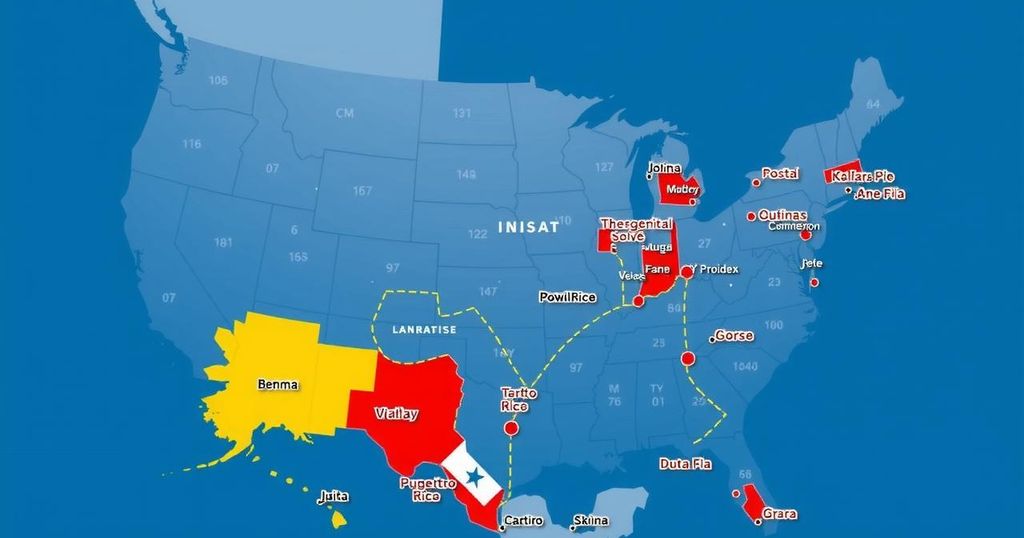The article discusses how Donald Trump’s campaign may have faced an ‘October surprise’ due to offensive remarks made about Puerto Rico at a rally. The growing backlash from the Puerto Rican community could significantly affect the election’s outcome, especially in swing states, due to historical voting patterns and demographic importance.
As the U.S. election campaign enters its final stretch, the race remains extraordinarily competitive, with commentators broadly labeling it a toss-up. However, an unexpected controversy may have positioned Donald Trump’s campaign on shaky ground. At a pivotal rally held at Madison Square Garden in New York City on October 27, a comedian’s disparaging remarks regarding Puerto Rico sparked widespread outrage, potentially jeopardizing Trump’s electoral prospects. The event featured a series of speakers who employed dark rhetoric concerning the nation’s state, creating a backdrop for Trump’s self-portrayal as the nation’s protector and liberator. The problematic element arose with comedian Tony Hinchcliffe’s opening remarks, where he referred to Puerto Rico as an “island of garbage.” This statement elicited significant backlash from the Puerto Rican community and prompted denunciation across the political spectrum, inadvertently energizing support for his opponent, the Harris-Walz campaign. Given the sensitive nature of this incident, it could lead to a notable Puerto Rican backlash in an election where every vote counts, particularly in swing states critical to the mounting of electoral college votes. The diverse voting demographic in states such as Arizona, Georgia, Michigan, Nevada, North Carolina, Pennsylvania, and Wisconsin will be pivotal in determining the election outcome. Notably, the margins of victory are often precariously slim, as evidenced in the past two elections when Democrats secured the popular vote without achieving a substantial electoral college advantage. Puerto Rico’s unique status as a U.S. territory means that while residents cannot vote in federal elections, Puerto Ricans living on the mainland can exercise their voting rights. Historically, Puerto Ricans tend to lean Democratic, although turnout rates have been inconsistent. Both Trump and his opponent have sought to engage this demographic, recognizing its potential influence in key battleground states. The demographic weight of Puerto Ricans in states like Pennsylvania, which carries 19 electoral college votes, is particularly significant. Recent endorsements for the Harris-Walz campaign, including those from globally recognized artists such as Bad Bunny, Ricky Martin, and Jennifer Lopez, underscore the vibrant engagement among Puerto Rican voters. Their reactions reflect a potent counter-narrative to Trump’s campaign, drawing attention to the perceived indifference towards the needs of Puerto Ricans post-hurricanes Irma and Maria. In essence, as the election approaches, the repercussions of recent events may well sway the electoral balance, as a collective Puerto Rican voice could tip the scales in favor of Harris-Walz, highlighting the influence of cultural representation in political engagement.
The article centers on the recent U.S. election campaign where the spotlight has turned to the potential impact of Puerto Rican voters on the election outcomes. With the political climate being particularly intense and competitive, the image presented by candidates could directly influence voter sentiments, especially in key swing states. The backdrop involves a controversial event in New York where remarks made about Puerto Rico triggered outrage, prompting a reevaluation of how Puerto Rican voters might respond at this crucial juncture. Understanding the role of demographics, particularly the presence of Puerto Ricans in swing states and their historical voting patterns, is essential in analyzing this electoral scenario.
In conclusion, the U.S. election is poised on a knife’s edge, and the comments made at a recent rally have ignited a possible backlash from Puerto Rican voters. As the Harris-Walz campaign gains momentum from this controversy, it serves as a powerful reminder of the significant role demographic dynamics and cultural representation play in electoral politics. If Puerto Rican voters mobilize in response to the insensitivity displayed, they could critically influence the outcomes in swing states, underscoring their importance in the electoral landscape.
Original Source: theconversation.com






